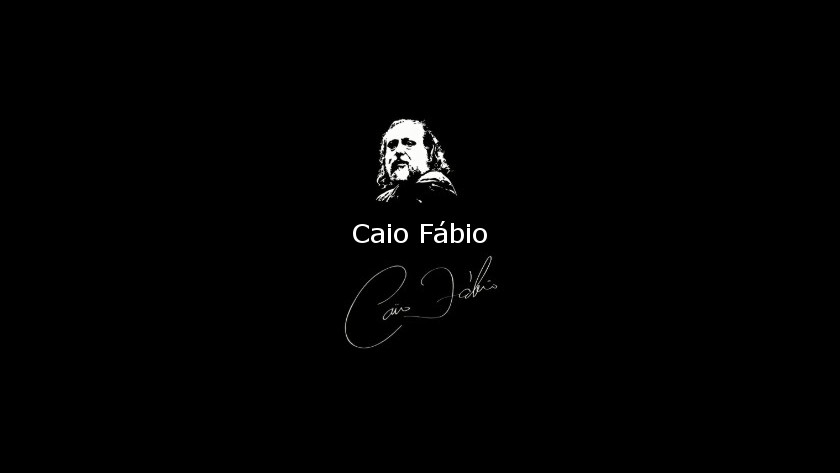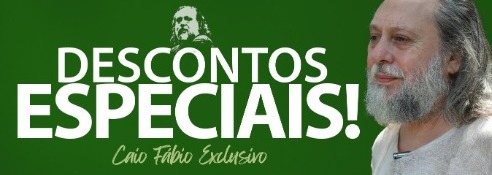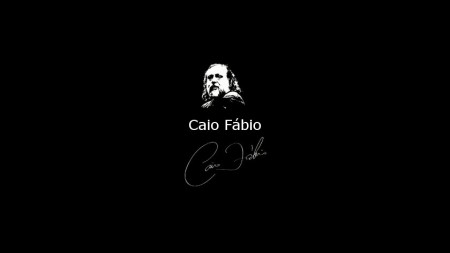
NEPHILIM - A Novel by Caio Fábio
NEPHILIM
.jpg)
a novel
Caio Fábio D’Araújo Filho
Translation: Wanda de Melo
Editor: Fausto R. Castelo Branco
"He said goodbye to his wife and children while he was pushed into that intermediary venue, where life and death would interchange complicities. In his heart, he did not believe he would make it. When procedures started, he dived into abyssal obscurity, and for a fraction of time he could not define, he embraced himself and commended his spirit. It was April 28, 1998. When he woke up from the surgery, he realized that the heart transplant had been successful. Deep inside, however, he had the feeling that the reality to which he had woken up was not the same one he had left. Back to his country, whenever meeting a friend, Abelard would say: 'Sometimes I think it was a soul transplant'."
This is how Abelard Ramez II begins his awesome journey into the fullness of his destiny — although he isn’t aware of it at first.
Now, dear reader, you are preparing to take this amazing trip with him and other friends within these pages.
We hope that traveling with Abelard will be an unforgettable experience that will somehow make your own life’s journey a lot more interesting, exciting and truly meaningful.
Thank you for joining in the adventure!
The www.caiofabio.com Team
Catalographic Data for the Brazilian Edition
Copyright by Caio Fábio
No part of this book may be reproduced without the consent of the author or the Publisher.
Editor: Anna Távora
Graphical Project and Cover illustration by Julio Mauricio
Electronic Editing by Rafael Saldanha & Denise Cordeiro
Revision: Vilma Homero
Maria da Glória Carvalho
Dalila Vieira
Mariana Tobri
F118n Fábio, Caio 1955
Nephilim/Caio Fábio
Rio de Janeiro: Razão Cultural 2000.
258 pages.
ISBN 85-86280-93-3
1. Brazilian Romance
RAZÃO CULTURAL EDITORA
Address: Avenida Nossa Senhora de Copacabana 1.122/ loja 112
Copacabana – RJ CEP: 22073-970
Tel/fax: (21) 522-0058
E-mail: editora@razaocultural.com.br
Visit our homepage
www.razaocultural.com.br
Printed in Brazil
About the Author
Caio Fabio D’Araújo Filho was born in Manaus, capital of the State of Amazonas, Brazil. He grew up in the surroundings of the great rainforests and learned to love and respect them.
In his teens, he moved to Rio de Janeiro with his family. After his father’s extraordinary Christian conversion, he went back to Manaus with his parents and siblings.
At the age of 18, after a period of great existential distress, he had an encounter with his parents’ faith. This radically changed his life. From a rebel without a cause, he became known as the youth preacher.
He got married at 20, and soon he was a father. He was formally ordained as a Presbyterian minister the following year, when he wrote his first book.
His fame came quickly. He could be seen on TV and newspapers in the north of the Country as a result of the crowds who gathered to listen to him preach in stadiums, squares and big temples. After only two years as a preacher, Caio Fábio was known as the best preacher in the northern region of Brazil. Later, he became well-known all around Brazil. He was said to be the most lucid, provocative, and creative voice in the so-called evangelical media. Despite that, he was unanimity among Protestants.
According to him, his career was severely damaged when he publicly stated his viewpoints about some religious practices he did not approve of. From then on, he was seen not only as a religious figure, but also as a public man whose actions went beyond the interests of the church.
A lover of social causes, Caio Fabio founded many organizations aimed at reducing the problems of the destitute. His greatest work, Fábrica da Esperança (Factory of Hope) was deemed as the major NGO in Latin America. It provided social assistance to over twenty thousand adolescents and young people, monthly, for many years in a row.
Besides that, he was one of the most important leaders of the civil movements that usually started off in Rio de Janeiro and spread all over the country in the 90’s.
In 1998, Caio Fábio got divorced and saw his name decline in the Christian community, the one he had served so much. This occurrence brought him his major sorrows. In the same year, his name was involved in a political scandal of major repercussions [whose developments disturbed him until 2005, when he was declared innocent by the Brazilian Judiciary after all possible investigation].
Caio Fábio, however, is not a spectator of life. Even in the most adverse circumstances, he wrote the book that is now in your hands. He says he would not hesitate to exchange this book for all the others — over 115 — he wrote and published during his 25 years of ministry because of the message this one contains.
Caio Fábio has been awarded titles of honor as a master of theology. A British Christian magazine and a specialized international survey organization considered him to be among the 100 most creative and respected Christian leaders in the 20th Century.
Dedication
1st Edition
To Hellena, my little granddaughter.
2nd Edition
To the vividly living, immortal memory of my son Lukas (1982-2004),
my young close friend, a beloved one I caressed so wholeheartedly.
Today he dwells in one of the many mansions of the Eternal Father.
Author’s Note
This is a book of fiction; any resemblance to facts is purely coincidental.
For this very reason, I have no other intention but to provoke my readers’ creative thought. I hope they can reflect, free of any religious bias, about the one of the most intriguing stories of humankind and its implications for the development of humankind’s psyche and myths.
Therefore, here I neither deal with doctrine nor offer elements of a theological nature. I only exercise the privilege of having received the blessing of creativity.
Therefore, here I neither deal with doctrine nor offer elements of a theological nature. I only exercise the privilege of having received the blessing of creativity.
Introduction
The Quantum Machine
...He also set eternity in the heart of man.
Solomon, in the Book of Ecclesiastes
As this millennium ends, a considerable number of people have changed their perception of time as a dimension. Nowadays, with the new experiments of quantum physics, a revolution is underway. There will be a great reduction in the gaps between science and religion, technology and biology, and machines and organic reality. Many of the so-called subtle energies — known by prophets and mystics as the spiritual realm — will be within the reach of science and technology.
Machines will be built of cells, creating a world of instant communication. Magnetic devices will replace the electric ones. After that, nothing we call “advanced” will be considered so.
In the midst of all this, a conclusion will be reached: The great quantum machine is not still to be created; it has existed for thousands of years.
It will also be revealed that this living machine has never been used to its full capacity on the Earth — with one exception, around two thousand years ago —, because after it was created free, it had a wish that, when fulfilled, blocked its sensors and inhibited its perception resources. This way, the quantum machine lost connection with the thousands of forms of subtle energies existing in the universe. The worst of all losses, however, was in the area of “voice recognition”. It became almost impossible for the machine to recognize its Creator’s voice. Nevertheless, its potential was not vanished. In due course, we will still know about the great wonders that inhabit it.
The extraordinary quantum technology present on this planet has a body, a soul and a spirit. The body experiences time; the spirit transcends time because of its extemporal nature. The soul makes the connection between the several forms of energy from the physics and psychophysics dimensions and the depths of the forms of existence that cannot be measured or taken as absolutely real in a world of tangible things, because they are spiritual.
Human life is the great everlasting-temporal complex to be discovered in the coming decades. When this awareness is installed, we will know that eternity inhabits the heart of humankind and time is nothing but a momentary impression of one of the many forms of being. We will also understand that our perception of eternity was hindered by something that the theological language calls the fall.
Above all, it will become clear that just as prophets visit that which will be, they can also visit that which has been, because in spirit, that which is is, since past, present and future are nothing but expressions of that which is and dwells the interior of human beings.
Chapter One
Mary, Flower of Christ
I will give you a new heart and
put a new spirit in you;
I will remove from you your heart
of stone and give you a heart of flesh.
— Ezekiel the prophet
He said goodbye to his wife and children while he was pushed into that intermediary venue, where life and death would interchange complicities. In his heart, he did not believe he would make it. When procedures started, he dived into abyssal obscurity, and for a fraction of time he could not define, he embraced himself and commended his spirit. It was April 28, 1998. When he woke up from the surgery, he realized that the heart transplant had been successful. Deep inside, however, he had the feeling that the reality to which he had woken up was not the same he had left. Back to his country, whenever meeting a friend, Abelard would say: “Sometimes I think it was a soul transplant.”
He felt, then, that a different mass of energy was pulsating inside him in a latent way. An unprecedented world of feelings and intuitions had possessed him, and he could not link it to anything reasonable in his usual world. It was as if the heart that now beat in his chest had its own emotional agenda and would not put by practicing his own interior rites: It would impose gladness when Abelard was sad, sadness when he was glad, or hostility when he knew he was being well treated.
And there was more to it: He almost could not stand getting inebriated by scents he had once ignored, dancing to the rhythm of songs that he would not enjoy before, recognizing inner beauty in people in whom he would only see well-built bodies, eating exotic food that had never belonged to his menu, and, above all, traveling to remote regions he had always overlooked in the past. Besides, Abelard Ramez II felt that his outlook on life had changed; he had the feeling that past, present and future were visiting this world at the same time.
He wanted an answer, so he immersed himself in reading. In a single book, he found hundreds of narratives that were identical to his feelings. Moreover, several scientific reports about the same phenomenon revealed that a transplanted heart not only played the role of a blood pump, but acted as a withholder of emotional memories in raw state; deep memories not elaborated and not filtered by the brain censorship.
Displeased with his own situation, he traveled again to Merlin’s land, where the heart transplant had been carried out. There, with the help of Doctor Isaac Harbor — one of the physicians who had operated on him —, he found out the heart donator’s identity.
As he got near the street where the donator had lived, strange feelings started invading his soul. He looked at a park and felt passionate, as if he had had a date there one day. He saw a little dog walking on the sidewalk. The animal ran toward him wagging its tail in a sign of intimacy and Abelard felt like taking it in his arms. He looked over a garden and cried, as if he once had meditated there. Eventually, he stopped in front of the house that his heart called “home”; it had not been necessary to double-check the address. He rang the bell, although he felt it was unnecessary, and a dark-skinned, white-haired man opened the door. Abelard felt like embracing him and calling him “Dad”.
“Excuse me. My name is Abelard Ramez II. I’m here because I received your daughter’s heart.”
The man invited him in and then called his wife too. She walked into the room and looked at Abelard. She recited, “That-which-is is. That-is-all and all-is-that.”
Abelard replied, “How interesting! Can you tell me what it means?”
“I don’t know, but our daughter used to say that.”
“This phrase has been running in my mind since I got the transplant."
Veronica’s parents were calm and loving. They told Abelard about their daughter’s most remarkable personality traits and her doings. The stories were amazingly similar to what Abelard had been through in the previous months.
What impressed Abelard the most was that, according to Veronica’s parents, she used to dream a lot. Sometimes her nightly productions were so real that she could not tell if they were fantasy or reality. In her dreams, she would visit different places and times in history. She said that if she could, she would change her name to “Mary, Flower of Christ”. Abelard said, “Veronica, veru icone. It’s a beautiful name, and means what I need: A true image.”
Abelard told Veronica’s parents what had been happening to him, thanked them for their attention and took leave. He was already in his car when Veronica’s mother said, “She liked the Book of Enoch very much!”
“I beg your pardon?”
Veronica’s mother repeated in a louder voice, “She used to read the Book of Enoch!”
Abelard waved them goodbye and left.
After returning home, things did not seem to get any better. His distress was still there, and he could no longer feel productive.
He resumed his work, but everything was still meaningless to him. Many noticed that he was through a great change, but nobody knew what it was or how to help him.
In his oddness and distant nearness to all things, Abelard realized that the best thing to do was to return to his hometown and try to find his true self again. Therefore, he decided to go back to Amazon. He invited his family to travel with him, but he soon realized that it would not be possible. His children had a life of their own; they were too grownup to follow him wherever he wished.
As he realized his anxiety kept increasing, he decided it was time to leave. Since he did not know what would happen, he wrote a letter to his children, relatives, and friends. He kept a copy of it and gave the original to his wife. He left without saying when he would return. Deep inside, an apocalyptic feeling came over him. The world as he knew it was about to end. He would never be the same again, but, oddly, nobody he loved would die. To a small extent, he would be the same Abelard, but with a different face.
He went to the airport and left without saying exactly where he was heading for, and unsure if he would ever come back.
* * *

